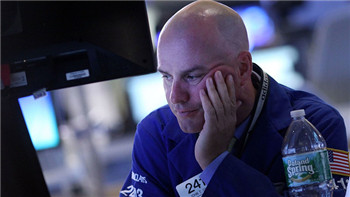(单词翻译:单击)

The unusual volatility that has taken hold of financial markets in recent weeks, resulting in some impressive moves up in asset prices and many more harrowing declines, will be with us for a while. Driven by a combination of tactical and structural forces, it is indicative of an ongoing shift in markets’ operating environment. And because of its potential for altering household and corporate behaviour, as well as the heightened risk of financial accidents, it amplifies the need to better manage downside risks to the global economy.
近几周金融市场的异常波动导致一些资产价格出现可观的上涨,但更多的是触目惊心的下跌。一段时间内,波动将继续存在。此轮波动受到策略性和结构性因素的综合作用,反映市场的运行环境正在发生变化。而由于它可能改变家庭和企业的行为,加上发生金融事故的风险增大,我们更加有必要改进对全球经济中的下行风险的管理。
There are six major reasons why higher volatility, up and down, is the new norm for financial markets:
波动性上升——起起落落——之所以成为金融市场的新常态,有六大原因:
First, the emerging world’s spreading economic slowdown is eroding a fundamental underpinning of high and stable asset prices. Gone is the notion of a steady global growth “equilibrium”, albeit at a relatively low level, in which dynamic emerging economies offset the sluggishness in Europe and Japan. Indeed, in virtually every systemically important emerging country (including Brazil, China, Russia and Turkey) growth is slowing; and, as highlighted by Mario Draghi, European Central Bank president, last Thursday, Europe is in no position to take up the slack — leaving too much of a burden on the US to act as a powerful global growth locomotive.
首先,新兴世界不断蔓延的经济放缓势头,正在侵蚀支撑资产价格稳定在高位的基础。关于全球稳定增长“均衡”的概念已不复存在——在这种格局里,尽管增长处于相对低的水平,富有活力的新兴经济体抵消了欧洲和日本的疲弱。事实上,几乎每一个具有“系统重要性”的新兴国家(包括巴西、中国、俄罗斯和土耳其)的经济增长都在放缓;而且,正如欧洲央行(ECB)行长马里奥德拉吉(Mario Draghi)近日所指出的,欧洲无法接过担子——这意味着美国要挑起过大的重担,充当强有力的全球增长火车头。
asset prices were high and, in some cases, in bubble territory. China is perhaps the best example of this. In a similar way to how the US pursued home ownership as a social objective a decade ago, Chinese officials encouraged broad-based participation in the stock market as part of the country’s journey towards a market-based system. And, again like the US with housing, the phenomenon resulted in a price bubble that is challenging to deflate in an orderly fashion.
第二,资产价格之前高企,在某些情况下处于泡沫区域。中国或许正是这方面的最佳例子。就像十年前美国把居者有其屋作为一个社会目标,中国官员鼓励民众广泛参与股市,把这作为发展市场体制计划的一部分。而且,与美国在房地产领域的情况一样,中国这种现象也导致了价格泡沫,并且很难以有序的方式消下去。
two markets, unhinged by structural earthquakes, transmit periodic bouts of financial instability to others. Emerging market currencies struggle to regain their footing in the face of multiple shocks — from China’s surprise change to its foreign exchange regime to the detrimental impact of lower global growth, massive capital outflows and, for some, sharply lower commodity export earnings. Oil is facing a similar phenomenon on account of disruptions to its supply, demand and swing producer dynamics.
第三,两个经历了结构性大震荡的市场把周期性的金融动荡传导到其他市场。面对多重冲击,包括中国意外调整汇率机制,全球增长放缓的有害影响,大规模资本流出,以及大宗商品出口收入大幅下降(部分国家),新兴市场货币难以重新站稳脚跟。而由于供应中断事件、需求因素以及弹性产油国(swing producer)的局势,石油市场也面临类似情况。
Fourth, there is less confidence in policymakers’ ability to respond quickly and effectively. Part of this is due to prolonged over-reliance on central banks as the only policy game in town; and part to the migration of major global challenges away from the direct reach of the US Federal Reserve and the ECB, the two most powerful central banks. This outcome of this weekend’s G20 deliberations in Turkey will do little to counter the erosion of markets’ confidence.
第四,市场对政策制定者快速、有效做出反应的能力信心下降。原因之一是太久以来过度依赖央行来制定政策;另一个原因是全球重大挑战脱离了两个最强大的央行美联储和欧洲央行的直接控制范围。日前G20土耳其会议的结果无助于挽回市场信心受损的状况。
Fifth, the clear and present danger of another “right policy at the wrong time”, this time out of the Fed. America’s central bankers have good internal economic reasons to hike interest rates when they meet next week, supported by Friday’s jobs report. But, just like China’s move to a more flexible currency system last month, this right domestic measure risks adding to global financial instability at this particular juncture.
第五,“错误时间的正确政策”的危险再次清晰地浮现在我们眼前,这一次将出自美联储之手。从国内经济的角度出发,美国央行官员本周开会时有很好的理由加息,周五的就业报告提供证据。然而,就像上月中国加大汇率灵活性的举措一样,在这个特别的关头,这项正确的国内政策可能加剧全球金融动荡。
Finally, recent market developments have reinforced concerns about disruptive pockets of illiquidity and product malfunction. Part of this is due to the regulatory and market-driven structural shrinkage of the broker-dealer intermediation role relative to end-user demand, especially when a change in consensus views leads to a broad-based desire for portfolio repositioning; and part reflects the proliferation of products, particularly in exchange traded and risk parity funds, whose promises of performance and liquidity are undermined in periods of market illiquidity.
最后,近期市场走势加深了人们对具有破坏性的流动性不足和产品故障问题的担忧。这部分是由于在监管和市场驱动下,经纪自营商的中介角色相对于终端用户需求出现结构性萎缩,特别是在共识观点变化导致普遍希望调整投资组合的情况下;还有一部分原因是,某些产品,尤其是交易所交易基金和风险平价基金的激增,这些产品关于业绩表现和流动性的承诺在市场流动性缺乏时期受到了影响。
The influence of these six factors is unlikely to dissipate soon. Moreover, they contribute to a more fundamental phenomenon — that is, the shift in the markets’ operating regime, away from central bank repressed financial asset prices and towards a process of repricing that better reflects the cyclical, structural and secular fluidity of the global system.
这六个因素的影响不大可能很快消失。此外,它们造成了一个更根本的现象——即市场运行机制的变化,从由央行抑制金融资产价格,转向更好反映全球金融系统的周期性、结构性和长期性波动的重新定价过程。
So far, the impact of higher volatility — both bad and good — has been contained in finance; and, so far, it has not caused any major financial accidents. But if it persists and gets more disorderly, the risk of spillbacks on to the real economy will rise, by making households less willing to spend and by undermining corporate investment in new plant, equipment and hiring.
目前为止,波动性上升的影响——包括好的和坏的影响——局限在金融领域;迄今也没有造成任何重大金融事故。但如果这种状况持续下去并且变得更加混乱无序,其向实体经济“溢回”的风险将会上升,使家庭更不愿意消费,使企业减少在新厂房、设备和招工方面的投资。
In the last few years, financial risk-taking has far outpaced economic risk-taking as investors have stretched far and wide for returns while companies have maintained high cash balances. The result has been a notable differential between (high) asset prices and (more sluggish) fundamentals. If markets’ volatility continues and becomes more unruly, the consequences could extend beyond the convergence of portfolio risk exposure towards the lower level of economic risk taking. The latter could itself be contaminated, raising the nightmare risk of a self-feeding cycle of economic and financial instability.
过去几年,金融领域的冒险精神超过实体经济领域,因为投资者广为寻求提高回报的路子,而企业坐拥大量现金。结果造成资产价格(高企)和基本面(较为疲弱)之间的显著差异。如果市场波动持续,并且变得更加难以控制,后果将不止是投资组合风险暴露的趋同,而是还将导致经济领域冒险精神更弱。后者本身就可能受到损害,增加了形成一个经济和金融不稳定的自反馈循环的可怕风险。
Mohamed El-Erian is chief economic adviser to Allianz and chair of President Barack Obama’s Global Development Council
本文作者为安联(Allianz)首席经济顾问、美国总统奥巴马(Barack Obama)的全球发展委员会(Global Development Council)的主席


